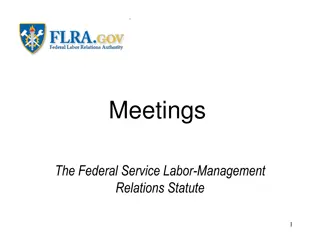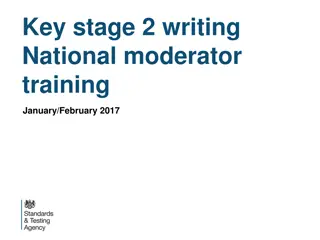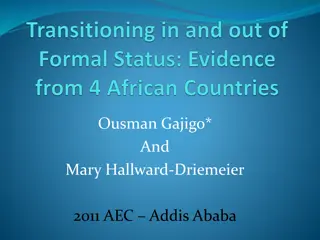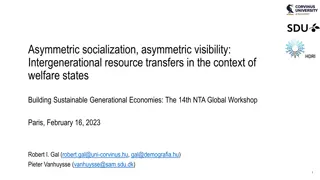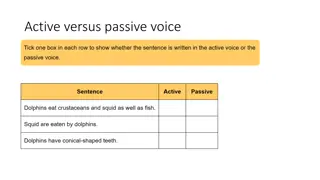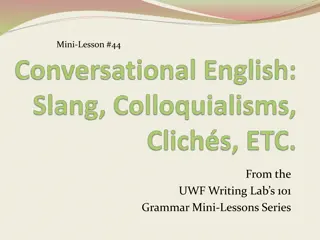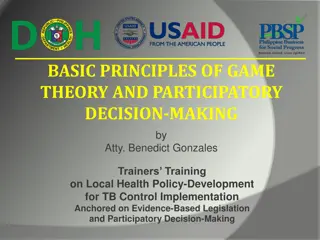Passive verb forms
Passive verb forms involve using "be" in a specific tense along with the past participle of a main verb to change the object of an active sentence into the subject of a passive sentence. The passive voice is commonly used in formal writing when the doer of the action is unknown, obvious, or purposel
2 views • 13 slides
Understanding Formality in Meetings under the Federal Service Labor-Management Relations Statute
The Federal Service Labor-Management Relations Statute provides guidelines for formal discussions and investigative examinations in the context of labor relations. It outlines the rights of unions to representation in formal meetings, emphasizing the importance of subject matter and formality. The d
0 views • 34 slides
Enhancing Academic Writing Skills: Key Concepts and Strategies
Explore the essential elements of academic writing, such as formality, clarity, precision, and objectivity. Learn to use formal English, avoid slang, and maintain an impersonal tone. Discover tips for clearer and more concise writing, along with techniques for rewriting sentences in an academic styl
0 views • 14 slides
Effective Strategies for Academic Writing Excellence
Academic writing for honours requires concise, structured writing supported by evidence from reputable sources. Key tips include organizing points logically, using structured paragraphs, formal language, and avoiding abbreviations. Writing in full words, avoiding personal pronouns, and maintaining f
0 views • 10 slides
Exploring Typographical Systems and Formality
Delve into the intricacies of typographical systems and formal rules, where symbols and theorems are defined through unique structures and operations. From designing a system based on prime numbers of hyphens to capturing the concept of divisibility, this journey uncovers the complexity and creative
0 views • 10 slides
Mastering Levels of Formality in Writing: Key Stage 2 Training Insights
Explore the nuances of formality in language use across different contexts, as detailed in the Key Stage 2 Writing National Moderator Training in January/February 2017. Learn how to manage shifts between formal and informal language through precise vocabulary selection and grammatical manipulation.
0 views • 27 slides
Exploring Diction in Writing: Connotation, Denotation, and Formality
Diction, the author's choice of words, is foundational in shaping voice. This content delves into diction elements such as connotation, denotation, and formality. It analyzes how words like "thirsting" and "prowling" evoke specific feelings and attitudes, giving examples from literature to illustrat
0 views • 8 slides
Determinants of Growth in Micro & Small Enterprises: Empirical Evidence from Jordan
Jordanian micro and small enterprises (MSEs) play a significant role in the economy but face challenges in accessing markets and obtaining finance. A research study was conducted in Jordan to analyze the factors influencing the growth of MSEs, including formality, education level of owners, technolo
0 views • 8 slides
Understanding Functional Styles in Language
The notion of style is explored in language use, including variations in literary and non-literary contexts, register linguistic features, and style-shifting according to formality. Definitions and classifications of style emphasize the distinctive features characteristic of register, genre, or auth
0 views • 30 slides
Exploring Sociolinguistics: Language Variation and Social Factors
Sociolinguistics delves into the study of language variation influenced by social factors, examining the relationship between language and its social context. It explores various aspects like standard pronunciation, language choice, speech acts, language components, language variety, and factors suc
0 views • 73 slides
Ensuring Fair Hearings for Persons with Mental Illness in VCAT Guardianship List
VCAT conducts hearings in its Guardianship List with a focus on minimizing formality and ensuring a fair process. Practical issues may arise, including parties being self-represented and dealing with technical evidence. The fairness of the hearing is crucial, especially when parties have not seen ev
0 views • 7 slides
Determinants of Formality and Informality in African Firms
This research explores the factors influencing the formal registration of firms in African countries and the impact of transitioning between formal and informal sectors. It delves into the effects on firm performance, access to infrastructure and finance, tax revenue, and worker welfare. The study a
0 views • 20 slides
Academic Writing Workshop Series: Formal Language Techniques
Explore how to transition from spoken language to formal writing in this workshop series. Participants will engage in activities such as sharing their favorite movies or books, free writing exercises, and learning about academic language features like formality, objectivity, and conciseness. The wor
0 views • 17 slides
Asymmetric Socialization and Resource Transfers in Welfare States
Exploring intergenerational resource transfers in the context of welfare states, this study examines three main channels: families, the government, and markets. It delves into different institutional arrangements governing asset-based reallocations, public transfers, and familial transfers. The leve
0 views • 12 slides
Understanding Active and Passive Voice in English Grammar
Explore the difference between active and passive voice with examples and explanations. Learn how to identify subjects, verbs, and objects in sentences. Discover the characteristics of active and passive verbs, and how emphasis and formality can be affected by using either voice in writing.
0 views • 13 slides
Avoiding Informal Language: Slang, Colloquialisms, and Clichés in Writing
Conversational English, including slang, colloquialisms, and clichés, is not suitable for academic or professional writing. Slang expressions, colloquial language, and clichés should be avoided as they lack formality and originality. Examples provided illustrate these informal language elements to
0 views • 8 slides
Principles of Participatory Decision-Making in Local Health Policy Development
Participatory decision-making involves giving stakeholders a voice in interventions, welcoming diverse perspectives, and avoiding domination by any individual or group. Challenges such as excluding certain groups or rubber-stamping ideas need to be addressed to ensure a truly participatory process.
0 views • 26 slides
Analyzing Puritan Culture Through Alienation in "The Crucible
Explore the portrayal of alienation in "The Crucible" by Arthur Miller as a lens to uncover the harsh truths about Puritan culture. The essay focuses on crafting an arguable thesis, developing fully detailed body paragraphs with quotations, and embedding them effectively. Practical tips to edit out
0 views • 11 slides

